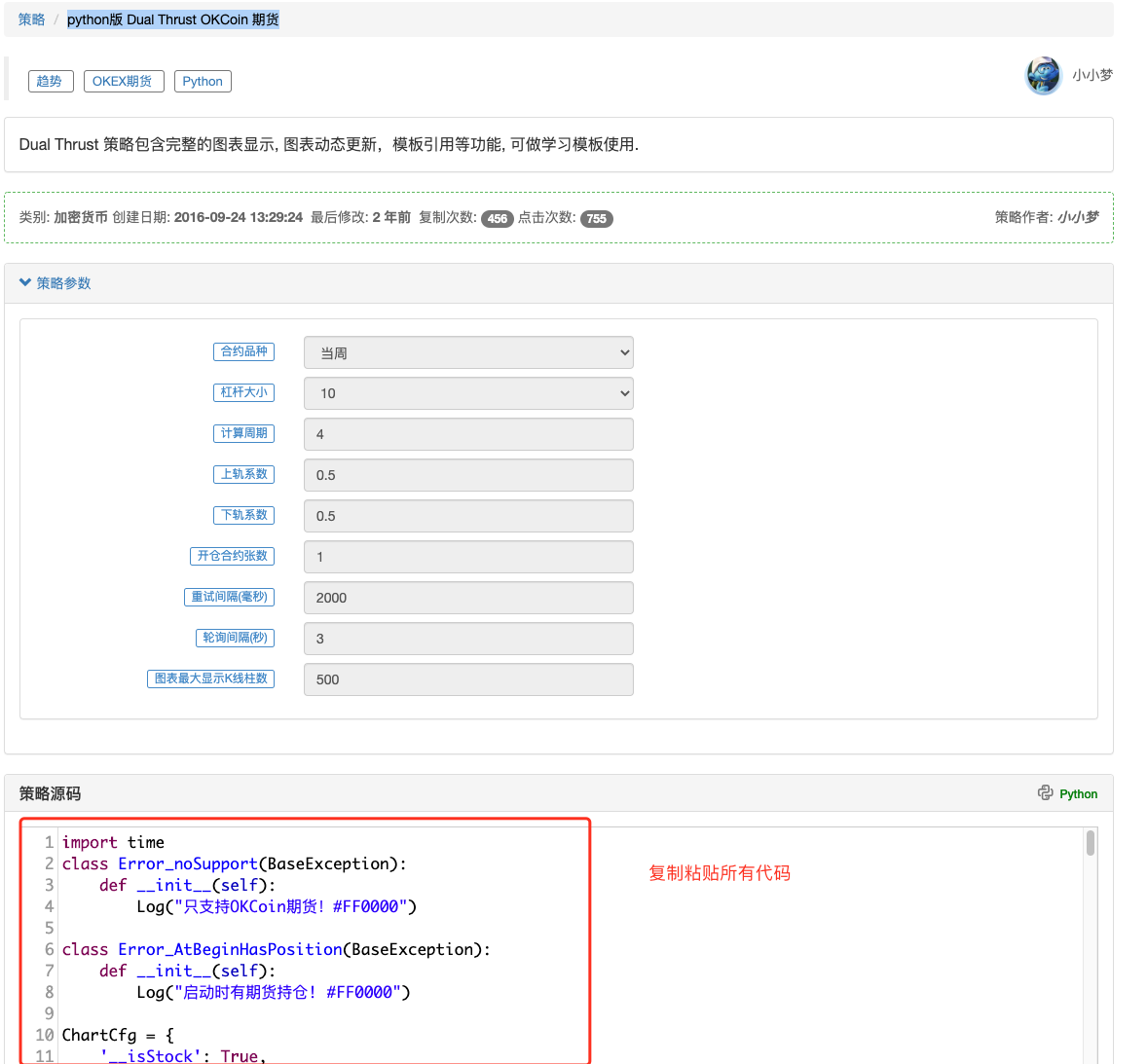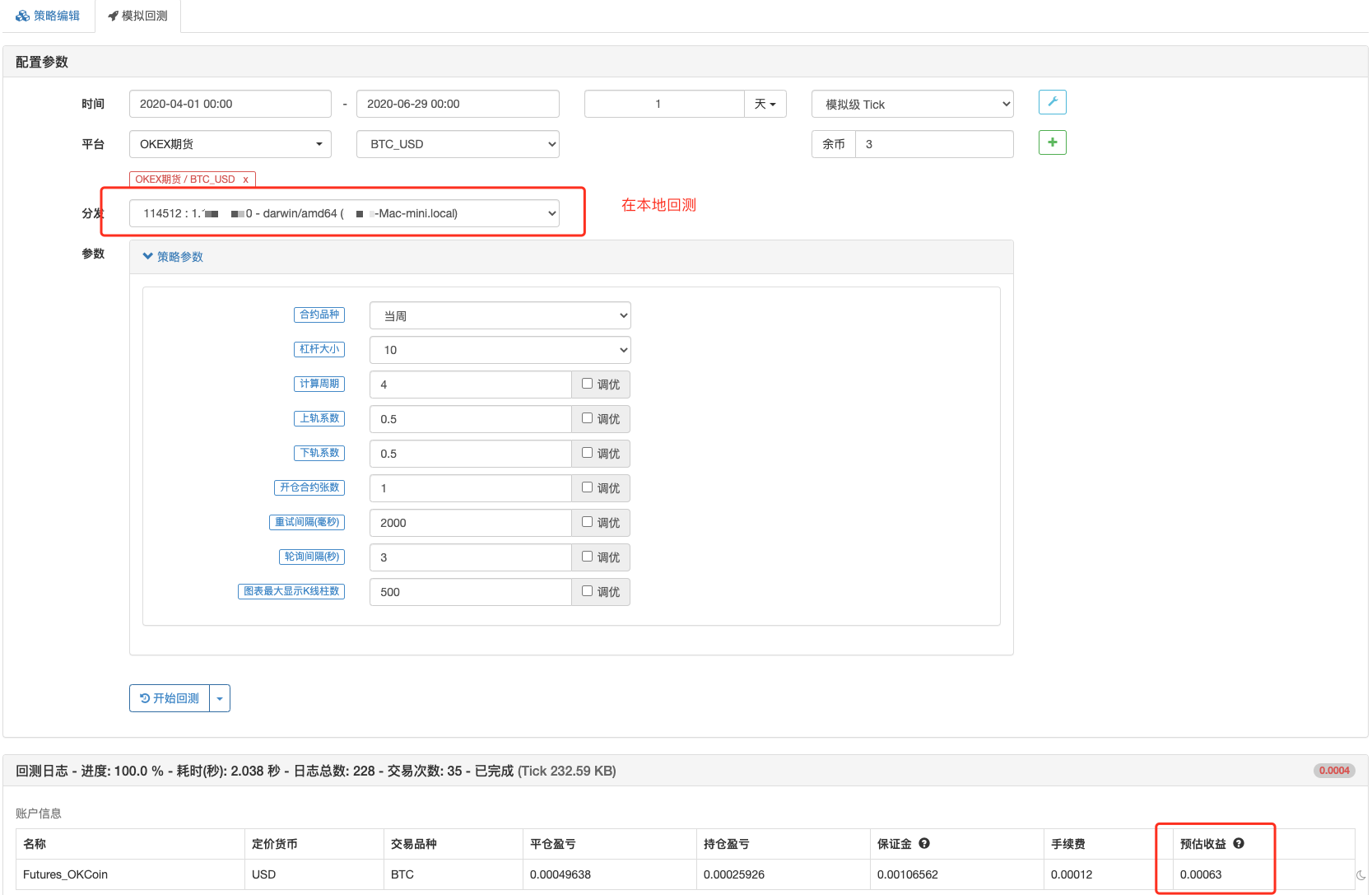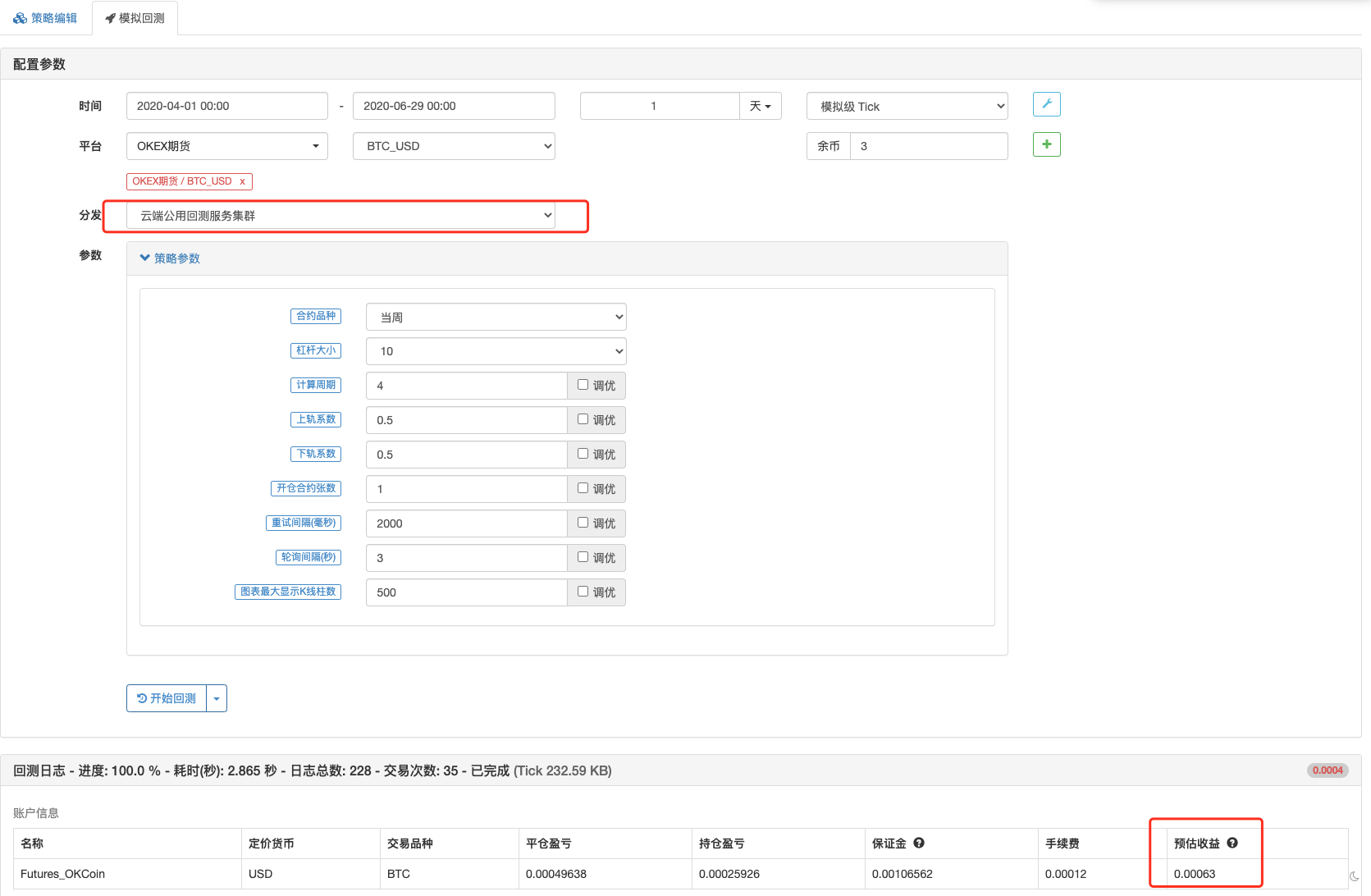Handshake teaches you how to wrap a Python policy in a cost-effective document.
Author: Inventors quantify - small dreams, Created: 2020-06-30 10:48:18, Updated: 2024-12-10 20:27:04
Handshake teaches you how to wrap a Python policy in a cost-effective document.
This article discusses two options, the other one at the end of the article is simpler (recommended).
There are many developers who use Python to write policies and want to keep their policy code files locally, because of security concerns.FMZ APIOne of the proposals in the document is:
Strategic security Inventor Quantified Trading Platforms, the policies are only visible to the inventor's account holders. Inventor Quantified Trading Platforms, the policy code can be fully localized, for example, by wrapping the policy in a Python package and loading it into the policy code.https://www.fmz.com/api#%E7%AD%96%E7%95%A5%E5%AE%89%E5%85%A8%E6%80%A7
This concern is unnecessary, but a solution is a perfect example of how it can be implemented.
Package a policy
We're looking for a simple Python strategy to demonstrate, using the classicDual ThrustThis is the first time I have seen this kind of thing.https://www.fmz.com/strategy/21856We strive not to change any part of the policy code, to wrap the policy in a file that can be called by the policy code on the FMZ platform, and the execution results are perfectly consistent with the direct execution of the policy. The biggest problem with wrapping is that the global objects, global functions, and constant values that are called by the policy code on the FMZ platform are not accessible in our wrapped file, so we have to find a way to pass these objects, functions, variables, and constants to the wrapped file.
- ReplicatedPython version of Dual Thrust OKCoin futuresThe code for the policy is pasted into a local Python file, a local Python file named testA.

Paste the testA file opened in the local editor.

- Added some code to keep the original package intact for the copy-paste policy code portion
# 函数、对象
exchanges = None
exchange = None
Log = None
Sleep = None
TA = None
Chart = None
LogProfitReset = None
LogStatus = None
_N = None
_C = None
LogProfit = None
# 策略参数
ContractTypeIdx = None
MarginLevelIdx = None
NPeriod = None
Ks = None
Kx = None
AmountOP = None
Interval = None
LoopInterval = None
PeriodShow = None
# 常量
ORDER_STATE_PENDING = 0
ORDER_STATE_CLOSED = 1
ORDER_STATE_CANCELED = 2
ORDER_STATE_UNKNOWN = 3
ORDER_TYPE_BUY = 0
ORDER_TYPE_SELL = 1
PD_LONG = 0
PD_SHORT = 1
def SetExchanges(es):
global exchanges, exchange
exchanges = es
exchange = es[0]
def SetFunc(pLog, pSleep, pTA, pChart, pLogStatus, pLogProfitReset, p_N, p_C, pLogProfit):
global Log, Sleep, TA, Chart, LogStatus, LogProfitReset, _N, _C, LogProfit
Log = pLog
Sleep = pSleep
TA = pTA
Chart = pChart
LogStatus = pLogStatus
LogProfitReset = pLogProfitReset
_N = p_N
_C = p_C
LogProfit = pLogProfit
def SetParams(pContractTypeIdx, pMarginLevelIdx, pNPeriod, pKs, pKx, pAmountOP, pInterval, pLoopInterval, pPeriodShow):
global ContractTypeIdx, MarginLevelIdx, NPeriod, Ks, Kx, AmountOP, Interval, LoopInterval, PeriodShow
ContractTypeIdx = pContractTypeIdx
MarginLevelIdx = pMarginLevelIdx
NPeriod = pNPeriod
Ks = pKs
Kx = pKx
AmountOP = pAmountOP
Interval = pInterval
LoopInterval = pLoopInterval
PeriodShow = pPeriodShow
The main function of the above code is to declare the global functions, variables used in the current file; then reserve the interface for importing these functions.SetExchanges,SetParams,SetFuncThe policy on the FMZ platform calls these functions and passes some of the functions, objects, etc. that are used.
Launch strategy on the FMZ platform
It's easy to get started, as follows:

The only code written on the FMZ platform is just these lines, and it's important to note that the parameters for this startup policy are to wrap it with the policy that we're wrapping.Python version of Dual Thrust OKCoin futuresSimilarly, you can directly copy the "Python version Dual Thrust OKCoin futures" policy, and then just clear the policy code and paste it on the screen.
import sys
# 这里我写的是自己放置testA文件的路径,具体我替换为xxx了,简单说就是设置自己的testA文件路径就可以了
sys.path.append("/Users/xxx/Desktop/pythonPlayground/")
import testA
def main():
# 传递交易所对象
testA.SetExchanges(exchanges)
# 传递全局函数 SetFunc(pLog, pSleep, pTA, pChart, pLogStatus, pLogProfitReset, p_N, p_C, pLogProfit)
testA.SetFunc(Log, Sleep, TA, Chart, LogStatus, LogProfitReset, _N, _C, LogProfit)
# 传递策略参数 SetParams(pContractTypeIdx, pMarginLevelIdx, pNPeriod, pKs, pKx, pAmountOP, pInterval, pLoopInterval, pPeriodShow)
testA.SetParams(ContractTypeIdx, MarginLevelIdx, NPeriod, Ks, Kx, AmountOP, Interval, LoopInterval, PeriodShow)
# 执行封装的testA文件中的策略主函数
testA.main()
In this way, we wrap the policy logic object in the testA file and place it locally on the device where the host is located, and on the FMZ platform, the bot that created this startup policy can directly load our local file and run it locally on the host.
Re-test the contrast
- Locally load testA file to retrieve

- The original policy, retested on the public server

The other, simpler way.
The file can be loaded directly into the executable. This time, we prepared a testB file that put the code for the "python version Dual Thrust OKCoin futures" policy.
import time
class Error_noSupport(BaseException):
def __init__(self):
Log("只支持OKCoin期货!#FF0000")
class Error_AtBeginHasPosition(BaseException):
def __init__(self):
Log("启动时有期货持仓! #FF0000")
ChartCfg = {
'__isStock': True,
'title': {
'text': 'Dual Thrust 上下轨图'
},
'yAxis': {
...
If the policy is too long, it is omitted and the policy code is not changed at all. Then prepare the "python Dual Thrust OKCoin futures", which is our strategy on the FMZ platform, create a bot, directly load the testB file, and execute it directly. Note that the "start policy" must have the same set of policy parameters as the original Python Dual Thrust OKCoin futures ("strategy interface parameters").

if __name__ == '__main__':
Log("run...")
try:
# 文件路径做了处理,可以写入自己testB文件放置的实际路径
f = open("/Users/xxx/Desktop/pythonPlayground/testB.py", "r")
code = f.read()
exec(code)
except Exception as e:
Log(e)
Do the retest:
The results of the retest are consistent with the above test.
The second method is obviously simpler, and I recommend using it, if there is a better way, welcome to the message.
- Quantitative Practice of DEX Exchanges (2) -- Hyperliquid User Guide
- DEX exchange quantitative practices ((2) -- Hyperliquid user guide
- Quantitative Practice of DEX Exchanges (1) -- dYdX v4 User Guide
- Introduction to Lead-Lag Arbitrage in Cryptocurrency (3)
- DEX exchange quantitative practice ((1) -- dYdX v4 user guide
- Introduction to the Lead-Lag suite in digital currency (3)
- Introduction to Lead-Lag Arbitrage in Cryptocurrency (2)
- Introduction to the Lead-Lag suite in the digital currency (2)
- Discussion on External Signal Reception of FMZ Platform: A Complete Solution for Receiving Signals with Built-in Http Service in Strategy
- Discussing FMZ platform external signal reception: a complete set of strategies for the reception of signals from built-in HTTP services
- Introduction to Lead-Lag Arbitrage in Cryptocurrency (1)
- Bitcoin volatility modeling and analysis based on the ARMA-EGARCH model
- Solution of numerical calculation accuracy problem in JavaScript strategy design
- Teach you to encapsulate a Python strategy into a local file
- FMEX trading unlocks the optimal order volume optimization Part 2
- FMEX trading unlocks the optimal order volume optimization
- Analysis and Realization of Commodity Futures Volume Footprint Chart
- FMEX ordering unlocked optimum to optimized quantity
- Calling a pin-and-pick interface to enable bot push messages
- FMEX transaction unlocked to optimized order quantity
- Simple Volatility EMV Strategy
- Deviation rate BIAS trading strategy
- Evaluation of backtest capital curve using "pyfolio" tool
- FMZ quantified My language - interface diagram
- Python version of Commodity Futures Intertemporal Bollinger Hedge Strategy (Study purpose only)
- Interfacing with FMZ robot using "Tradingview" indicator
- FMZ Quantified My Language - Parameters of the My Language Exchange Library
- Commodity "futures and spots" Arbitrage Chart Based on FMZ Fundamental Data
- High-frequency backtest system based on each transaction and the defects of K-line backtest
- Python version of commodity futures intertemporal hedging strategy
- Some Thoughts on the Logic of Crypto Currency Futures Trading
qq89520I was inspired to think that selenium could be used for many other things.
qq89520Learning
Inventors quantify - small dreamsHa ha, any ideas that you can come up with, let's discuss it together.